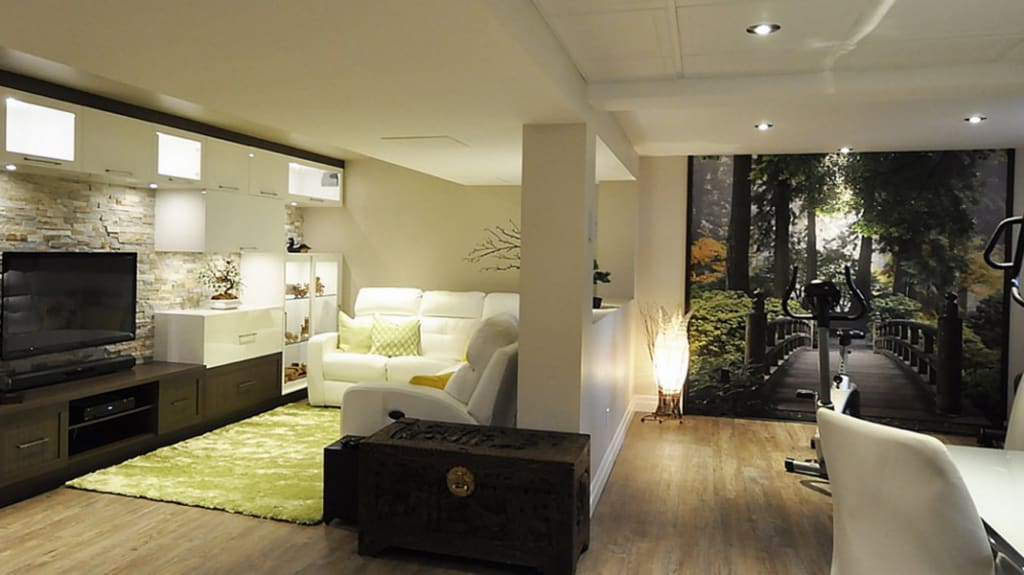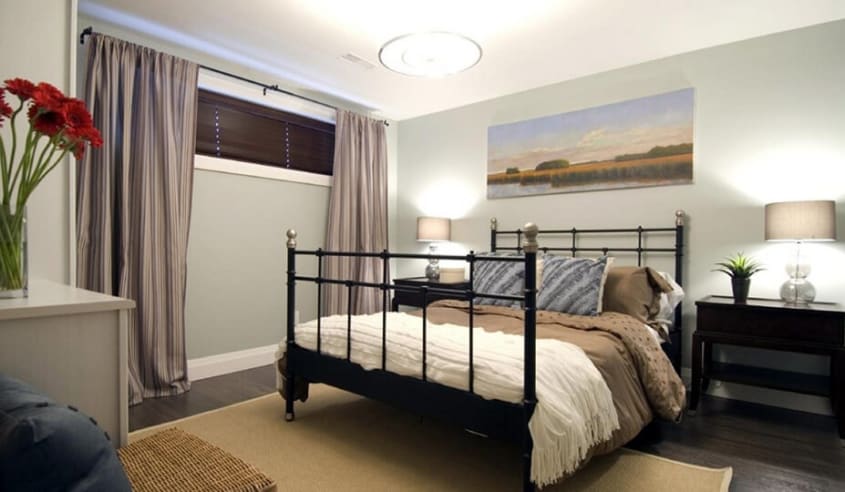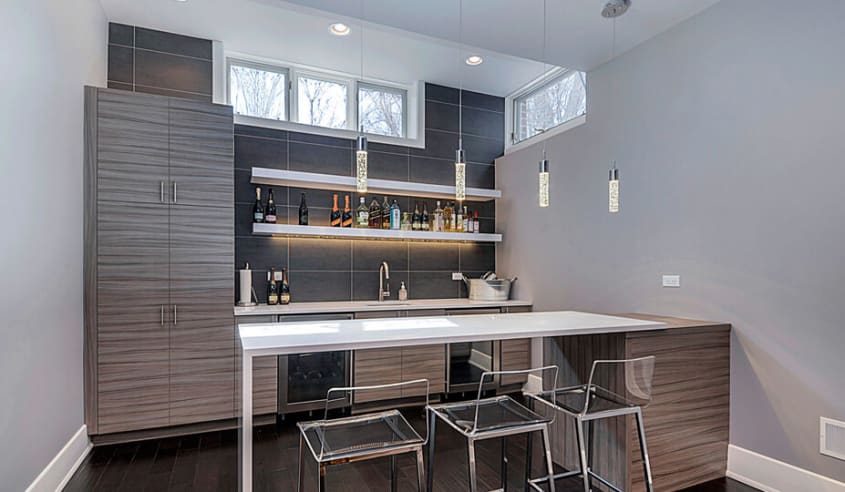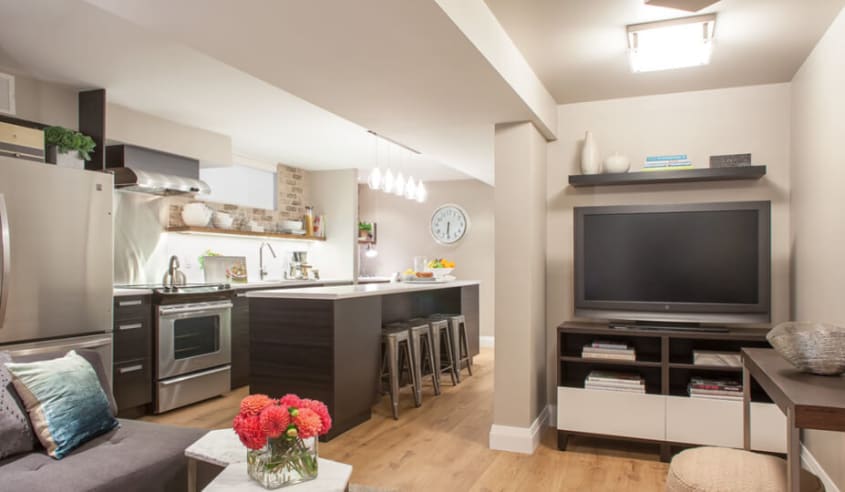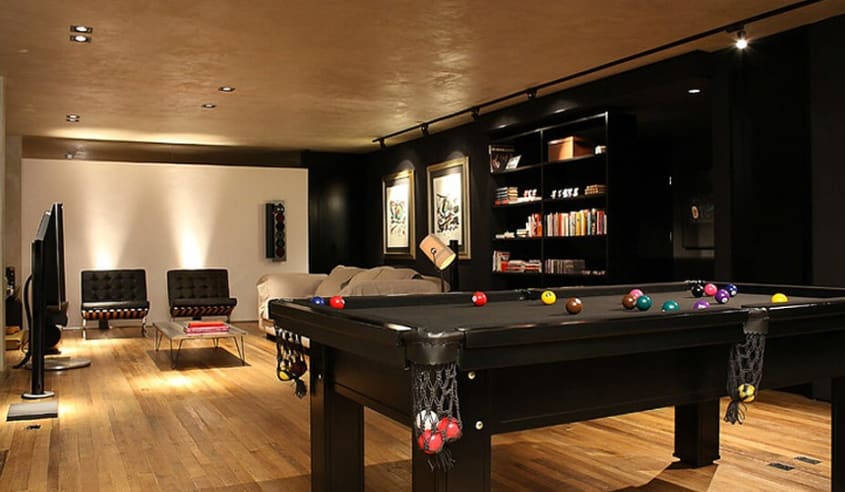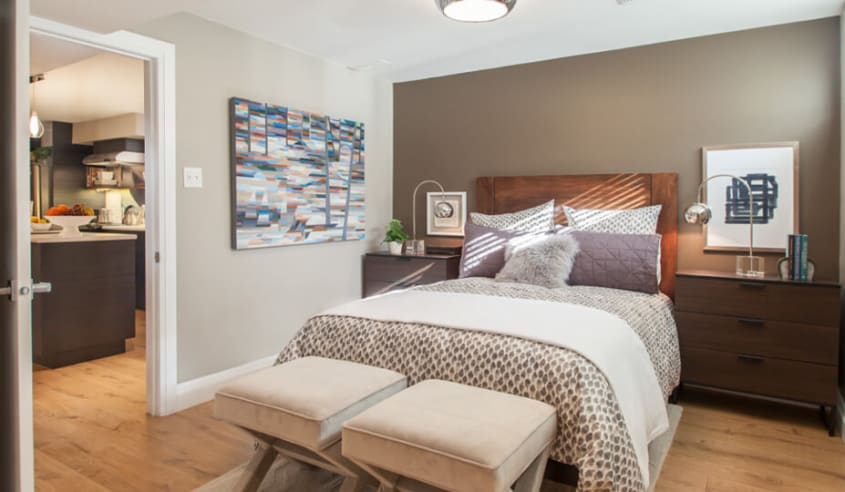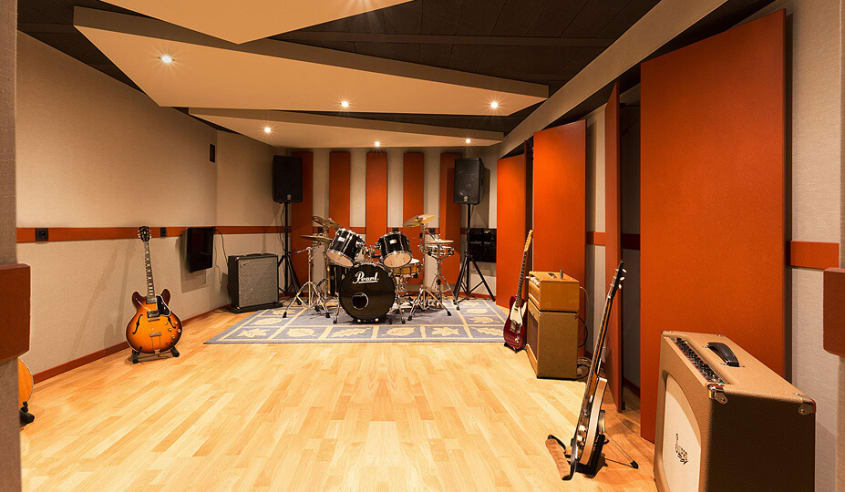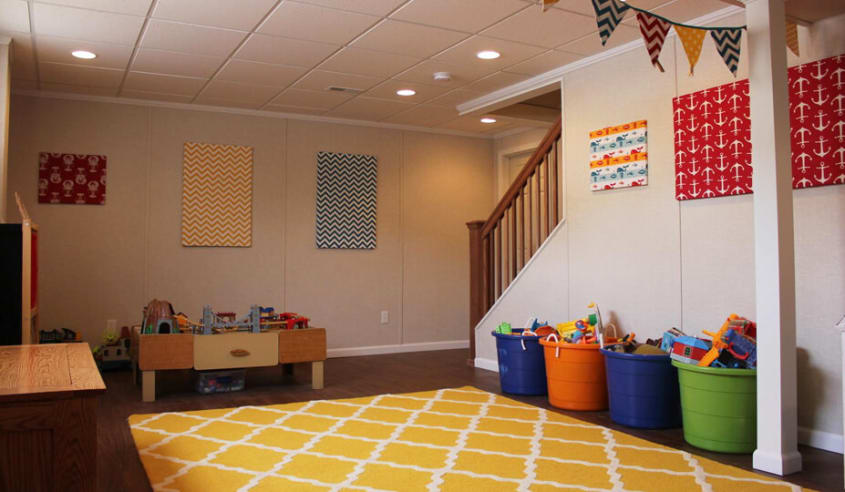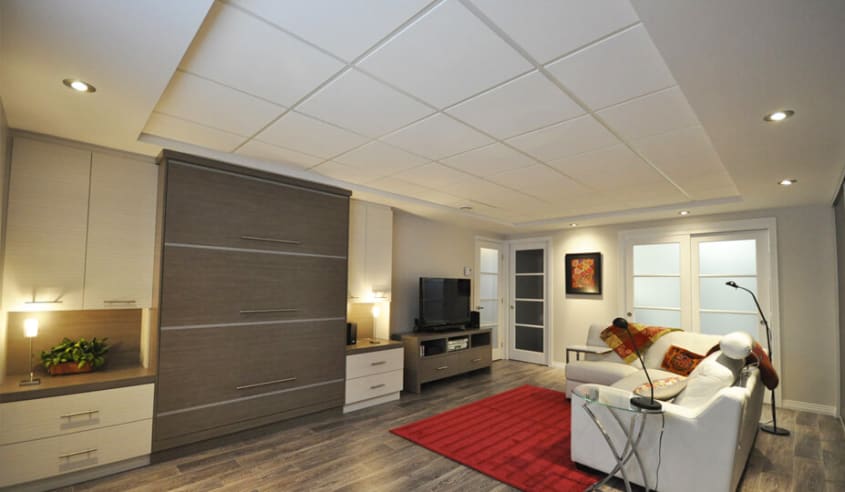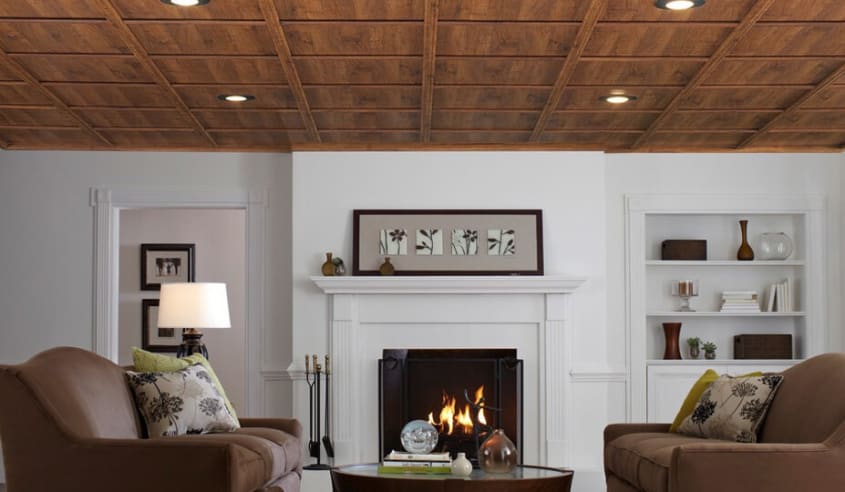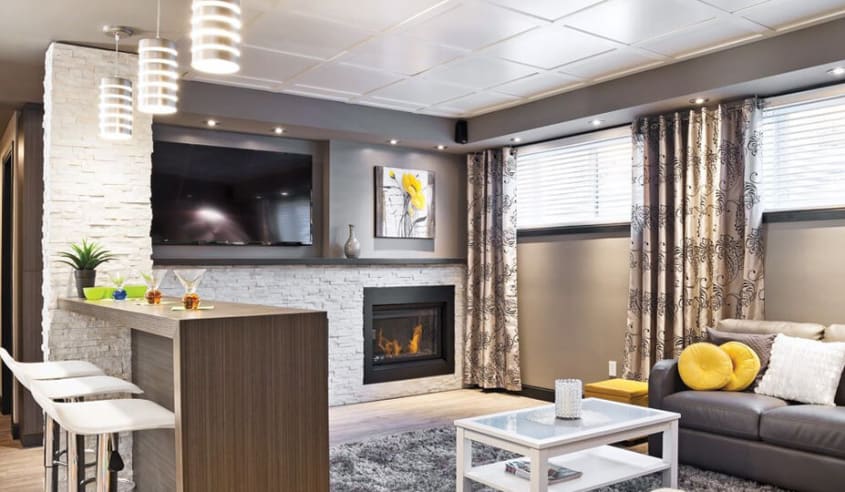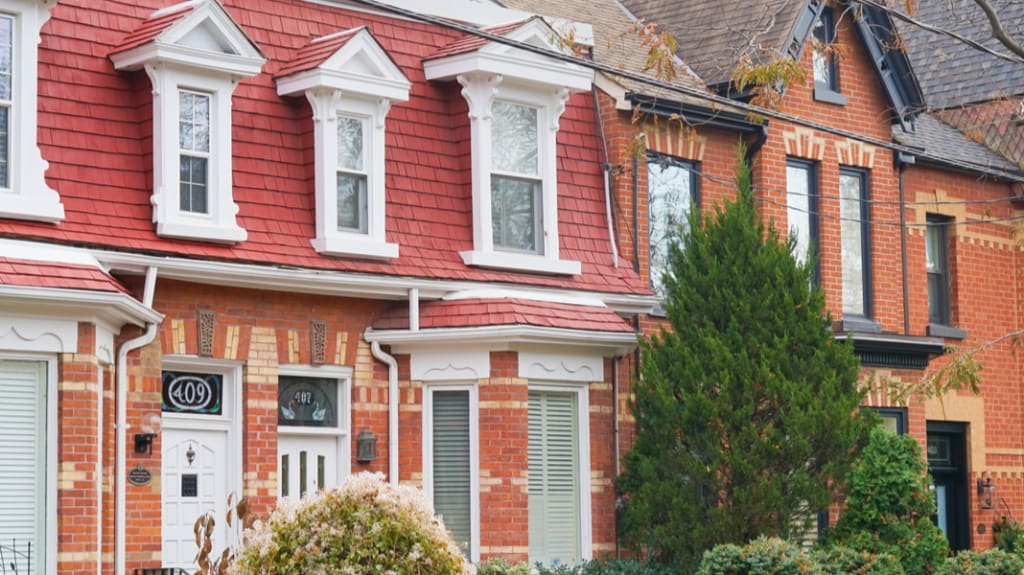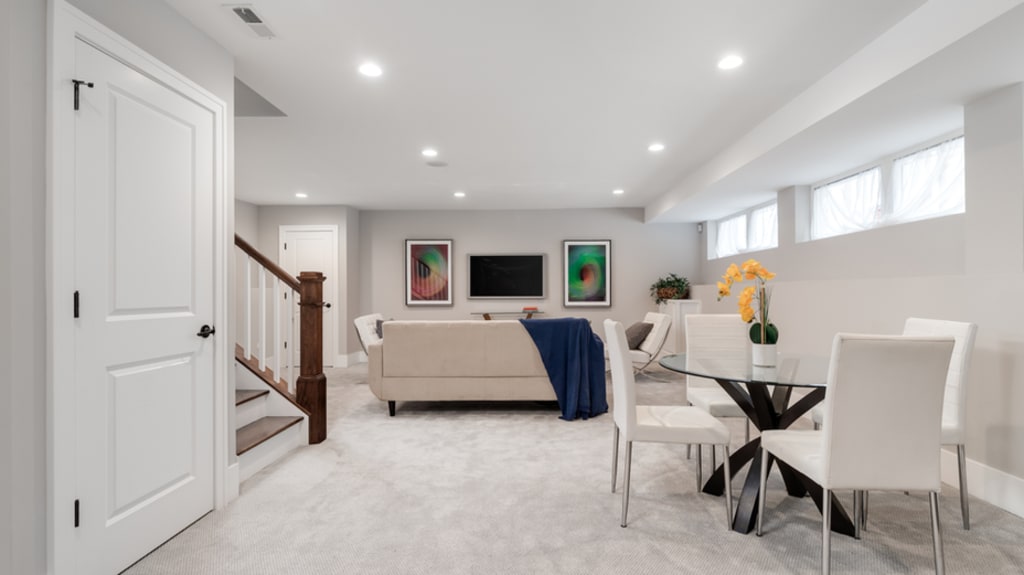In a perfect world, you wouldn’t hear any sounds coming from the basement – not the sound of your teenager watching action movies at max volume, not the sound of the tenant’s teething baby, nor that of your household’s aspiring trumpeter. What happens in the basement, should stay in the basement. But since the world’s rarely perfect, it’s smart to look into ceiling soundproofing.

Reasons to soundproof your basement ceiling
Soundproofing your basement not only benefits those in the living areas upstairs but also those in the basement. It provides privacy to both parties and reduces any annoyances linked to sound travelling through the ceiling.
Last year, we put together a post featuring the top 10 basement ideas. We barely mentioned ceiling soundproofing in any of them, but each, from the home theatre to the bachelor, would be better with the extra privacy soundproofing creates. Three ideas from that post jump out as inspiration for definite soundproofing candidates.
Parents with young kids
Young moms and dads often consider soundproofing the basement if they foresee their downstairs space as becoming a playroom one day. And when their kids become teenagers and start inviting their friends over, a soundproofed basement gives parents the freedom to not be disturbed. And as a bonus, if the kids are down there, they’re not out causing trouble.
Guys who want a man cave
Watch sports. Play cards. Get loud. Dude out. If you want that basement to be your sanctuary, don’t give anyone else a reason to come down, like to complain about the noise. Realistically, soundproofing your basement isn’t 100% effective. However, it does muffle sounds quite a lot – allowing you to kick back and enjoy your private haven.

Converting it into a bachelor apartment
Why not turn your basement into a rental property? You’ll be able to cover mortgage payments or make a little extra money on the side – especially if you don’t currently make much use of the space. Though, be sure to soundproof the basement’s ceiling. Trust us, your future tenants, as well as yourself, will be grateful you did. You’ll both have the privacy you need for your day-to-day, as well as have peace and quiet when it matters most.
Of course, you won’t need to limit your space to be a rental property. Maybe you’re planning on converting the basement so that your parents or adult children can have a place of their own while still being close to family.
Ceiling soundproofing: Materials to use – 4 options
Like everything else in the world of renovations, you and your basement contractor have multiple ways to tackle the project based on budget. From least to most expensive:
Sonopan soundproofing panels
Certainly, the most efficient option, especially for basements converted into apartments, Sonopan soundproofing panels absorb a wide range of frequencies – blocking sounds from travelling through. It’s unique patented technology has made these panels quite resilient and can be used in new constructions or when renovating. Plus, they’re made of 100% recycled wood, light, and easy to install. Sonopan panels are definitely the most optimal and cost-efficient option for your soundproofing needs.
Fibreglass insulation
Certainly, you know this as a solution for keeping the heat in, but enough of it packed into a ceiling offers moderately effective soundproofing. It’s not the best solution out there, but will definitely muffle sound adequately if that’s all you’re looking for!
Acoustic Tiles
It’s not the most aesthetically pleasing of the options, but it’s certainly effective. Acoustic tiles are essentially used for suspended ceilings and can be found in many different styles and qualities. We frequently see this style of soundproofing in basements converted to be home offices, or even as an inexpensive soundproofing alternative in schools.
Acoustic drywall
For an easy and simplistic solution, acoustic drywall works wonders. It’s a little thicker than your usual drywall and costs a little more, but it is worth the investment. Putting up this kind of material on your ceiling will have a better soundproofing effect than regular drywall.
Is soundproofing your ceiling worth the investment?
That depends on what you’re looking to invest in.
Will it allow you to rent out your basement and get a great return on investment?
Will it improve your quality of life upstairs or the quality of life or that of downstairs?
Can it save you money in other ways or increase the value of your house?
Don’t forget that if you choose to soundproof your basement ceiling with fibreglass insulation, you’ll keep in more heat downstairs, which should lower your energy bills.
If you decide soundproofing is for you, here are some quick DIY fixes
The first (and most obvious) are rugs on the floor above the ceiling in question. They’ll muffle the sounds on both sides. Another option, if you can enforce it, is a simple noise restriction for those downstairs. Obviously, this won’t be terribly effective if you have a tenant with young kids living down there, but you can certainly try.
Not only does sound travel through the ceilings and walls, but it might be travelling through any air vents – whether they be on the ceiling or at the top of your walls. A quick-fix would be to simply block these air vents. However, that might not be ideal. The best way to soundproof (or at least muffle some sound) coming through air vents would be to add a Sound Maze. It will require some work on your part, but it’s definitely an alternative to ripping up the ceiling or covering the entire ceiling with acoustical tiles.

When you’re ready to soundproof your basement, we’ll be here for you!
We’ve got many general contractors that will be able to help you out with your entire basement renovation. They have the experience needed to soundproof your basement’s ceiling properly right before putting the finishing touches and closing off the walls and ceiling. Feel free to ask them what the cost difference will be – between soundproofing and not soundproofing your ceiling – when they set up quotes for your basement renovation.
Get in touch with us today by filling out our form, or by tel: 1-888-670-9742, to get up to three quotes from our Verified Contractors in your region. Happy renovations start here!
